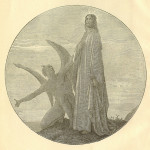We run our website the way we wished the whole internet worked: we provide high quality original content with no ads. We are funded solely by your direct support. Please consider supporting this project.

Are you Afraid of Demons?
I remember learning about germs in fourth grade. We were told our world was saturated with tiny invisible creatures that can infect wounds and make us sick. I immediately stopped sharing already-chewed gum with other kids, stop using my sister’s toothbrush and started washing my hands after going to the bathroom. Most kids had similar reactions.
But I’ll never forget how my friend Stephanie reacted. She got weird! About the only thing she ever talked about after this class was germs. We were playing badminton in gym class the next day, and she didn’t want to touch the badminton racket she was given until it was washed off. “It’s probably filled with germs,” she said. In fact, Stephanie didn’t want to touch anything that had been touched by anyone until it had been cleaned.
Stephanie had developed germ paranoia. I remember feeling bad about this, mainly because Stephanie was really cute and I had hoped to recruit her to join in a delightful but germy game some of us had recently discovered called spin-the-bottle. Now that Stephanie had become a germ freak, I realized this was probably never going to happen.
Experience has taught me that a certain percentage of people react to the teaching that the world is populated with hostile demons the way Stephanie reacted to the teaching about germs. They become demon paranoid. They fearfully obsess on the topic and tend to see a demon behind every headache, sneeze or computer glitch.
This is obviously not a sound biblical response. Despite the fact that Jesus and his disciples certainly believed the world was oppressed with evil forces, they exhibited a complete freedom from fear in regard to such entities. In fact, the fearlessness of the early Christians was one of the chief “selling points” of early Christianity, since most people in the ancient world lived in fear of demonic forces.
The reason the early church was so free from fear was because, as powerful as they knew the fallen powers to be, they were perfectly confident that Christ was far stronger and that he had in principal defeated the powers on Calvary. They knew that Jesus came to destroy the devil and his works (Heb 2:15; 1Jn 3:8) and to thereby set people free from any fear of the devil. The early Christians knew that in Christ all their sins had been nailed to the cross and that this meant the powers have been disarmed and made a laughingstock (Col 2:13-15). They knew that they were “in Christ,” and Christ was seated “far above all rule and authority, power and dominion, and every name that can be invoked” (Eph 1:21). They were confident that the one who resided in them (the Holy Spirit) was more powerful than the one who was “in the world” (1 John 4:4). And they knew that, as powerful as the fallen powers may continue to be, they could not separate disciples from the love of Christ (Rom 8:38-39).
The cure for demon paranoia is not to pretend the world isn’t populated with demonic forces, anymore than the cure for Stephanie’s germ paranoia would have been to deny the pervasive reality of germs. You never improve things by denying reality. To the contrary, the cure for demon paranoia—or germ paranoia—is to broaden your understanding of reality.
Yes, germs are everywhere. But they are not usually life-threatening, and there are simple things you can do to protect yourself against them. It’s important to know about them, but never appropriate to obsess on them. So too, it’s true that hostile demonic forces populate our environment. But for people who have made their life a domain in which God reigns, these forces can’t ever threaten the life we have in Christ — the only life that really matters to us. And there are simple things we can do to protect ourselves against these forces. It’s therefore important to know about demonic forces, but never appropriate to obsess on them.
The main thing believers need to do to counteract demonic forces is to simply remember who they are in Christ. In Christ, we have not been given a spirit of fear, but of power, love and self-control (1 Tim 4:7). In Christ, we are seated far above all rebel powers (Eph 2:6). In Christ, we have the same authority to vanquish evil powers that Christ had himself (Luke 10:19-20).
If we remember who we are in Christ, we have nothing to fear. Instead it’s the demonic forces that fear us. We are the aggressors who are breaking down their defensive gates, not the other way around.
Image by B Rosen via Flickr
Category: General
Tags: Demonization, Demons, Fear, Spiritual Warfare
Topics: Spiritual Warfare, Cosmic Conflict
Related Reading

The Cross and Cosmic Warfare
Since the time of Anselm in the 11th century, Western theology has focused almost all of its attention on the anthropological dimension of the atonement. In the most popular understanding, the chief thing that God was accomplishing on the cross was satisfying God’s perfect justice and thereby atoning for our sins. The work of the…

The Demonic Affects Us All!
Many contemporary Western Christians think we only engage in spiritual warfare when we encounter somebody who is exhibiting bizarre, demonically-inspired behavior, such as the demonized people Jesus confronted in the Gospels. Since most Western Christians rarely hear about, let alone personally encounter, such people, the concept of spiritual warfare plays little to no role in…

What Are the “Keys to the Kingdom”?
And I tell you that you are Peter [petros = rock], and on this rock I will build my church, and the gates of Hades will not overcome it. I will give you the keys of the kingdom of heaven; whatever you bind on earth will be bound in heaven, and whatever you loose on…

Who Needs to Pray and Fast? (podcast)
Greg puts a bow on our shortest episode ever. Episode 634 http://traffic.libsyn.com/askgregboyd/Episode_0634.mp3

Podcast: Did the Devil Make Me Do It?
Greg peeks into the complexity of our spiritual world and offers wisdom for discerning spiritual activity. http://traffic.libsyn.com/askgregboyd/Episode_0299.mp3

God’s Kind of Holy War
This is part three of a series on Revelation. You can find part one here and part two here. While there will come a day when the sacrificial victory of the Lamb and of his people will be apparent to all (5:13; 15:4; 21: 23-4), only to those who embrace the perspective of the heavenly…
